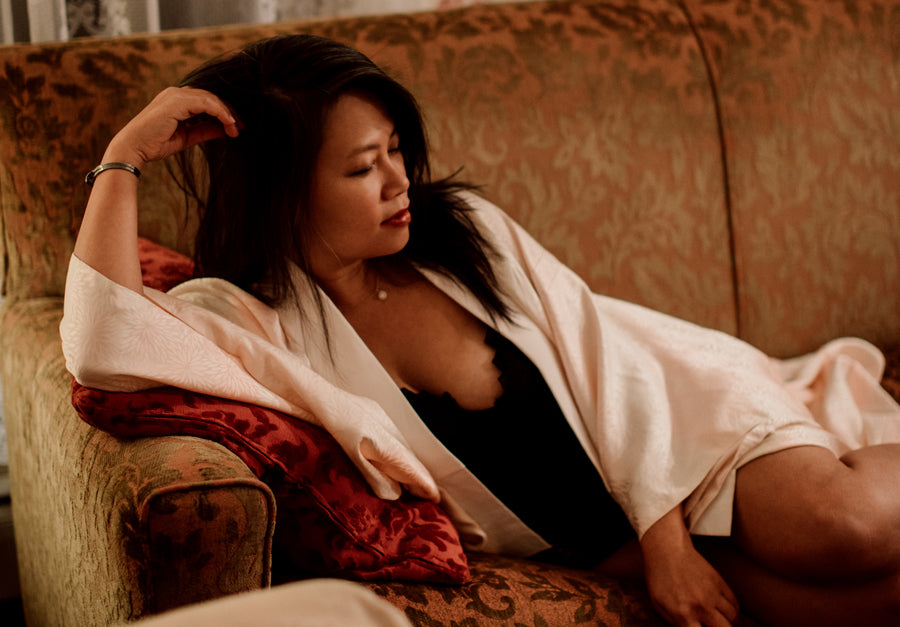The Revolution Continues: Owning Our Own Pleasure

In my years of working in the field of women's sexuality I have heard one issue voiced consistently across many ages, identities and varieties of experience: the issue of how to ask for what you want in sex.
Most of us grow up in a culture that discourages forthright communication about sex, and emerge from adolescence into adulthood with little to no role modeling on how to actually ask for -- and receive -- what we want. But in addition to lackluster sex education, women face a particular hurdle: the avoidance of female pleasure in general, and the double standard that applies to how we teach boys and girls about sex.
Boys, in general, are more expected to be sexually active, to masturbate, and to initiate sexual encounters, and male sexual entitlement is often framed as “boys will be boys.” Girls are trained to be vigilant against being harmed, assaulted or impregnated, and unfairly saddled with cultural and religious dogma that discourages female sexual expression and discounts the importance of female sexual pleasure at all.
Is it any surprise, then, that so many women enter adult sexuality with enormous training to please others, at the expense of their own pleasure and wellness? I met K in a workshop after she’d been through two traumatic events: she had had cancer and recently left a marriage in which her sexual pleasure had never been a priority. Sex had always been on his terms. It was when he wanted and how he wanted, and he got angry or withdrew and punished her emotionally if she didn’t give in. Foreplay was perfunctory at best, penetration was the main event, and sexual intimacy ended when he had an orgasm, rolled over and went to sleep.
“Feelings of unworthiness lived in my body,” she said. She described many nights of lying awake after he had fallen asleep snoring, overwhelmed by the emotional pain of feeling so uncared for. After a round of cancer treatment, she ended up leaving the marriage, and I met her once she was in a process of beginning to open up. For K, no one had ever told her that her pleasure mattered. She had been shamed for masturbating as a child and raised to be a “good girl” who was acquiescent and polite; asking for things meant you were needy and disruptive. Her own parents had had an unhappy marriage: “I could count on one hand the number of times I ever saw them hug or kiss,” she said. Enjoying sexuality and advocating for her pleasure had never been on the menu.
Over the next few years, I witnessed K explore her sexuality: she joined a women’s group, went to workshops, explored sex toys and worked with me privately. Through experimentation she began to get an idea of what turned her on and began to see her sexuality as beautiful. Finding her voice in the bedroom, though, is not something that happened overnight.
K’s story illuminates a familiar question for many women: when no one has ever encouraged you or told you that your pleasure is important, how do you begin to ask for what you want? The answer lies first in changing that core belief: in affirming that your pleasure IS important and does matter. For this reason, masturbation, fantasy and personal sexual exploration are all helpful in affirming, enjoying and celebrating our own sexual pleasure. The more we understand what turns us on, the more able we are to communicate and direct our partners to help us access deeper states of pleasure, arousal and erotic joy. We also need the support and encouragement of other women, and a place to share our experiences, to talk honestly about what’s going on for us without the mask of needing to appear perfect.
Lastly, we cannot ask for what we want when the dynamics of the relationship do not support us to do so. We cannot ask for what we want sexually when our partner’s ego is wrapped up in being the Perfect Lover Who Can Read Our Mind even if they are actually doing the opposite of what we want. We cannot ask for what we want if we fear doing so will upset or humiliate the other person, or if there is no courage or empathy or curiosity in the relationship dynamic, which are the raw materials that make these kinds of conversations possible. We cannot ask for what we want if we do not first believe we deserve to receive it. We cannot ask for what we want if we have gotten used to so little, in the past, that even with a supportive partner in the present we act like the tiger in the cage, pacing back in forth in a prison cell of our own habituation.
In this sense, it’s an act of sexual revolution when women ask for what they want and advocate for their pleasure. To do so is to do something radical and affirming in an anti-erotic culture that thrives on women’s sexual passivity.
K’s journey required first understanding what she wanted and then finding partners who were genuinely invested in her pleasure. Once she had that as a baseline, she worked through the nervousness, shyness, and the fear of communicating “wrong”--most of which was inherited from her family and wrapped up in the idea that “Good girls don’t do that.” Ultimately, she came to see that NOT speaking up for her desires was more dangerous than speaking, because staying silent laid the groundwork for miscommunication, misunderstanding, distance, and pain.
The last time we spoke, her energy was clear, relaxed and open as she reflected on coming to see her sexuality as a beautiful, lush garden. She had swept out the shame, the guilt, and the inherited burdens from family and culture, and tended to her own pleasure just like nourishing young plants. She knew what turned her on, how she liked to be touched, and what kind of fantasies worked for her, and she had the voice to share it all: “My sexuality is a delicious garden that’s ready to be worshiped,” she laughed.

Leonore Tjia
Contributing Writer
Leonore Tjia (pronounced “Chee-ah”) is a feminist sexuality educator who helps people create more presence, play, pleasure and power in the bedroom and beyond. As a trained practitioner of Internal Family Systems therapy, she assists people in recovering the parts of their sexual selves that have been exiled and repressed. Based in the San Francisco Bay Area, Leonore is an artist-healer whose work focuses on reawakening the raw life force and inner wildness that make us feel erotically alive. Find her, and more about her work and workshops at luminoussex.com

Curious Intimate Skincare collection includes an array of potent medicinal plants that rejuvenate, nourish, and protect intimate tissues in formulas that deeply contemplate the science of a woman’s physiology in tandem with respect for a woman’s sexual needs. Designed to support the healthful function of a woman’s intimate biochemistry, our formulations acknowledge the crucial relationship between cellular health and a balanced microbiome.
Curious Intimate Skincare promotes balanced pH, which plays a vital role in overall vaginal health. We dispense with the troubling ingredients found in conventional products that cause harm or interfere with intimate ecology, while providing an entourage of plant-sourced oils and botanicals that work synergistically to provide cellular structural support and therapeutic phytonutrients. There is quite simply no silkier, lighter, more natural intimate skincare available.
Curious Sexual Wellness and its products and materials are not intended to treat, diagnose, cure or prevent any disease. All materials published by Curious Sexual Wellness are provided for educational purposes only. Please seek the advice of a qualified healthcare provider for any questions you have regarding a medical condition.
Curious is a registered trademark of the Luminary Medicine Company


Comments on this post (0)